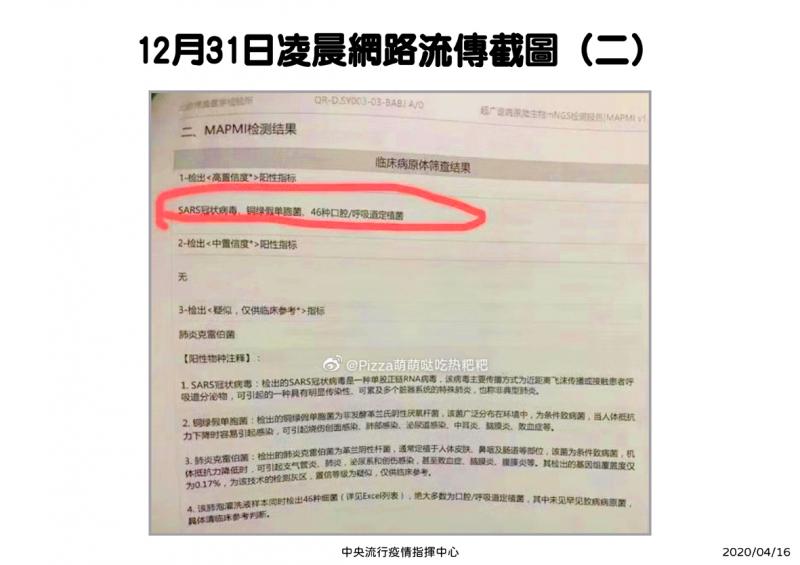Centers for Disease Control (CDC) Deputy Director-General Philip Lo (羅一鈞) yesterday said that a post on Professional Technology Temple (PTT) was what on Dec. 31 last year alerted him about a disease outbreak in Wuhan, China.
At about 3am, a CDC doctor specializing in disease prevention had shared information from a post on PTT, the nation’s biggest online academic bulletin board system, in a private chat group, said Lo, who is also an official at the Central Epidemic Command Center.
The original post was made on PTT at about 2am, he said, adding that as he was CDC spokesman at the time, he often woke up at about 5am to look at reports.

Photo courtesy of Philip Lo
After seeing the information his colleague had shared, Lo said that he “felt, from a professional standpoint, that it was different from typical tip-offs.”
The PTT user — identified as “nomorepipe” — had included key images in their post, including a screenshot of messages sent by Chinese doctor Li Wenliang (李文亮) indicating that “seven cases of SARS” had been confirmed as originating from the Huanan Seafood Wholesale Market in Wuhan, he said.
Lo said that he became alarmed when saw “SARS.”
Severe acute respiratory syndrome coronavirus 2 (SARS-CoV-2) is the name that has since been given to the novel coronavirus that causes COVID-19.
Lo said that the lack of a date or official stamp in an examination report shared in the PTT post made him believe that it had been shared by a doctor after receiving the results.
Moreover, the messages in the screenshot looked like they were leaked from an internal chat group for medical personnel, Lo said, adding that this made the information seem more credible than other tip-offs.
Lo expressed thanks to the whistle-blowers in China, especially Li, and the PTT user, who allowed Taiwan to gain quick access to the information and succeed in its prevention efforts.

UKRAINE, NVIDIA: The US leader said the subject of Russia’s war had come up ‘very strongly,’ while Jenson Huang was hoping that the conversation was good Chinese President Xi Jinping (習近平) and US President Donald Trump had differing takes following their meeting in Busan, South Korea, yesterday. Xi said that the two sides should complete follow-up work as soon as possible to deliver tangible results that would provide “peace of mind” to China, the US and the rest of the world, while Trump hailed the “great success” of the talks. The two discussed trade, including a deal to reduce tariffs slapped on China for its role in the fentanyl trade, as well as cooperation in ending the war in Ukraine, among other issues, but they did not mention

Japanese Prime Minister Sanae Takaichi yesterday lavished US President Donald Trump with praise and vows of a “golden age” of ties on his visit to Tokyo, before inking a deal with Washington aimed at securing critical minerals. Takaichi — Japan’s first female prime minister — pulled out all the stops for Trump in her opening test on the international stage and even announced that she would nominate him for a Nobel Peace Prize, the White House said. Trump has become increasingly focused on the Nobel since his return to power in January and claims to have ended several conflicts around the world,

GLOBAL PROJECT: Underseas cables ‘are the nervous system of democratic connectivity,’ which is under stress, Member of the European Parliament Rihards Kols said The government yesterday launched an initiative to promote global cooperation on improved security of undersea cables, following reported disruptions of such cables near Taiwan and around the world. The Management Initiative on International Undersea Cables aims to “bring together stakeholders, align standards, promote best practices and turn shared concerns into beneficial cooperation,” Minister of Foreign Affairs Lin Chia-lung (林佳龍) said at a seminar in Taipei. The project would be known as “RISK,” an acronym for risk mitigation, information sharing, systemic reform and knowledge building, he said at the seminar, titled “Taiwan-Europe Subsea Cable Security Cooperation Forum.” Taiwan sits at a vital junction on

LONG-HELD POSITION: Washington has repeatedly and clearly reiterated its support for Taiwan and its long-term policy, the Ministry of Foreign Affairs said US Secretary of State Marco Rubio yesterday said that Taiwan should not be concerned about being used as a bargaining chip in the ongoing US-China trade talks. “I don’t think you’re going to see some trade deal where, if what people are worried about is, we’re going to get some trade deal or we’re going to get favorable treatment on trade in exchange for walking away from Taiwan,” Rubio told reporters aboard his airplane traveling between Israel and Qatar en route to Asia. “No one is contemplating that,” Reuters quoted Rubio as saying. A US Treasury spokesman yesterday told reporters